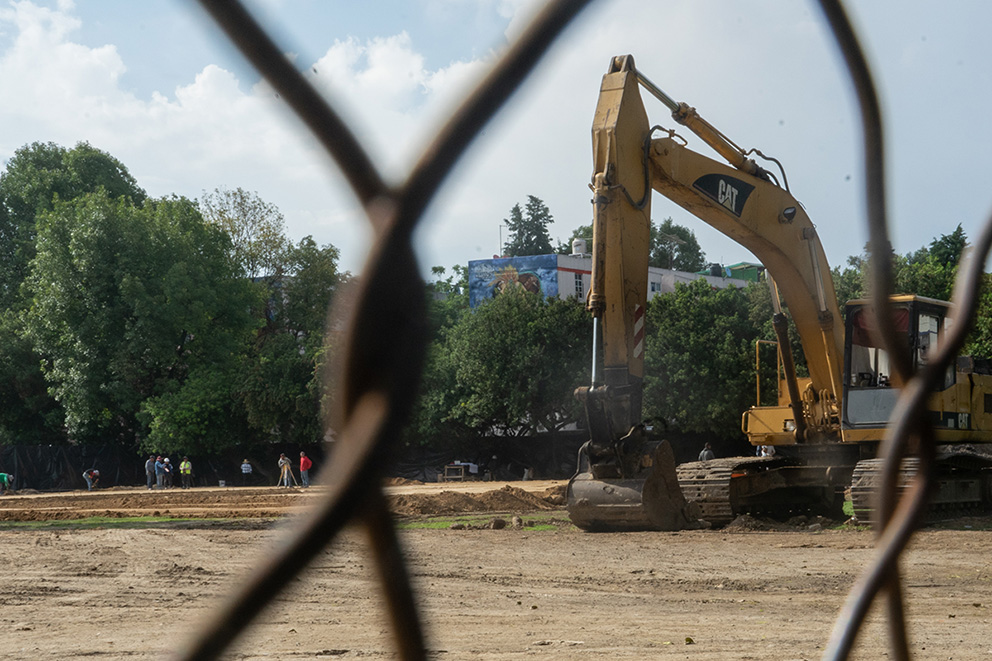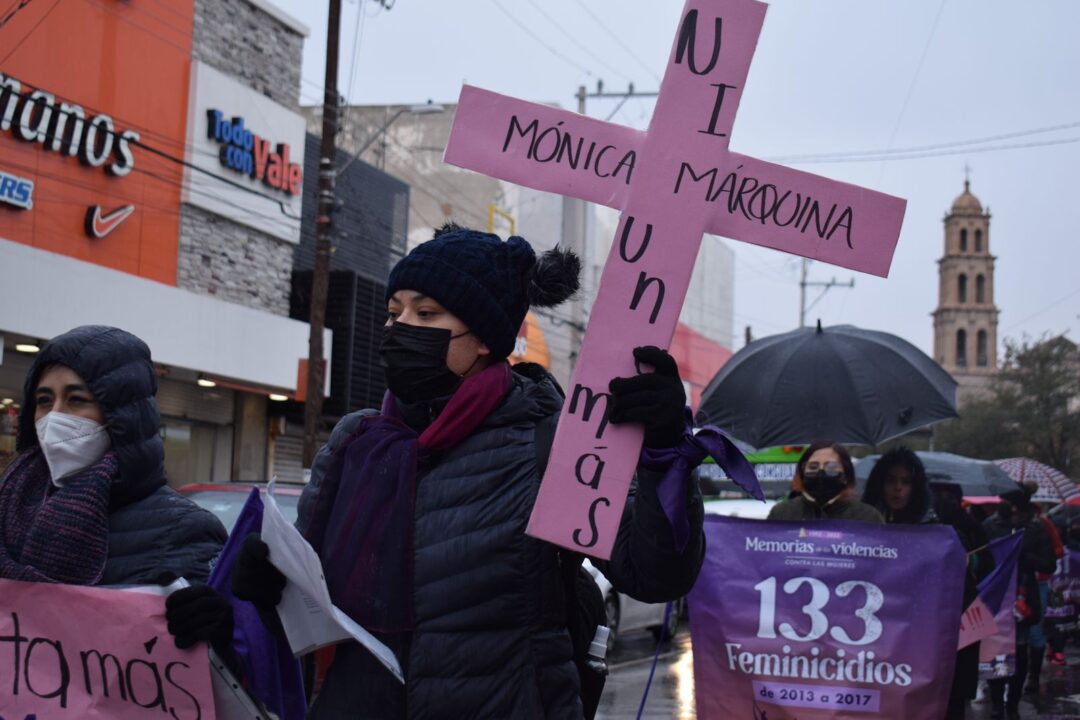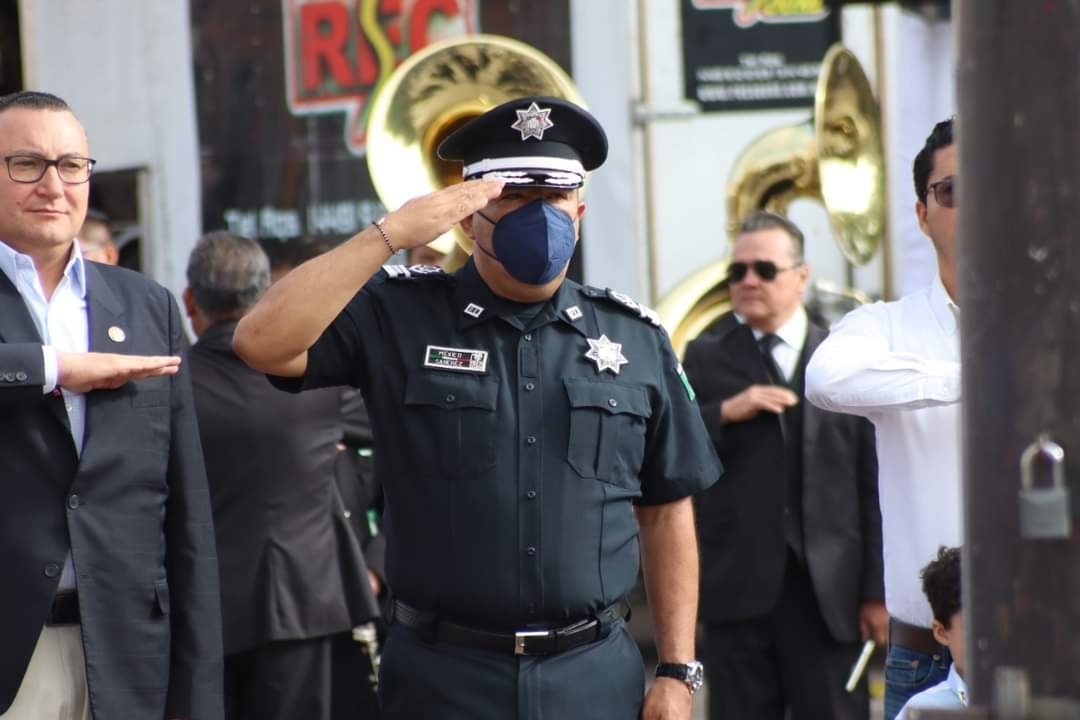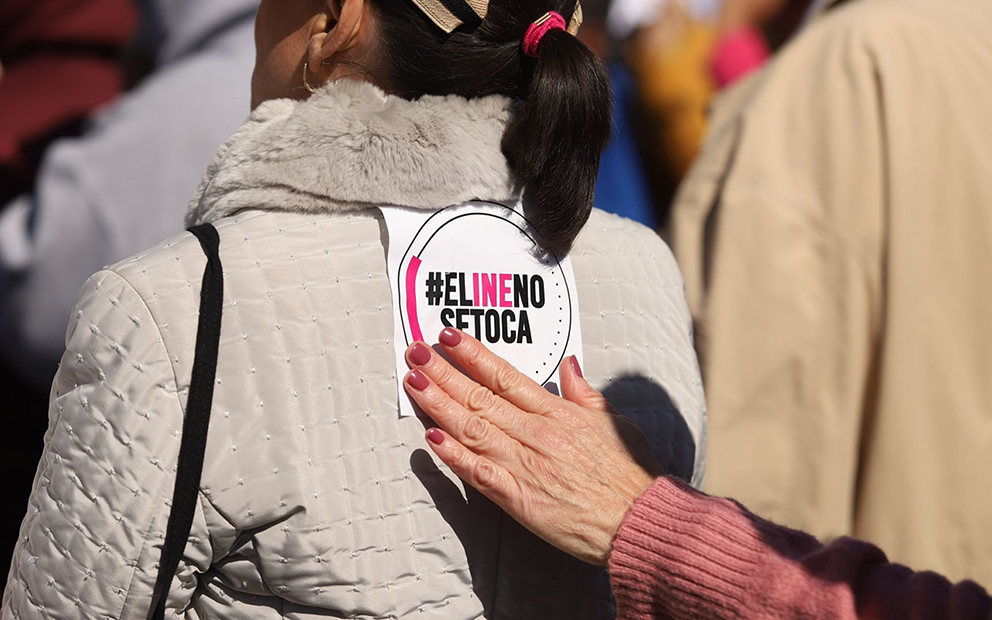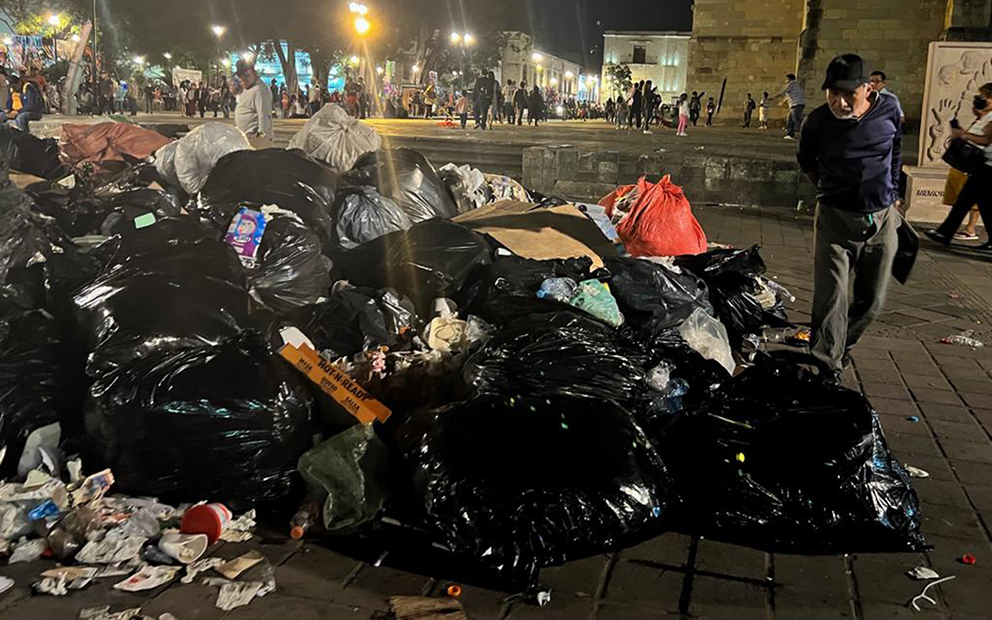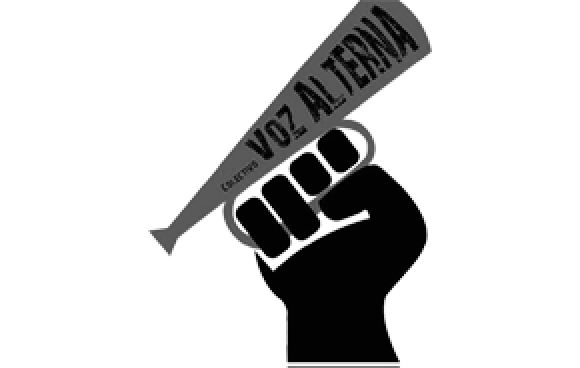National Guard barracks are under construction in Xochimilco and Azcapotzalco, and another is expected to be built in the Cuauhtémoc borough. Organized residents presented a complaint to México City’s Human Rights Commission, asking them to investigate and repair damages caused.
Text by Daniela Rea, originally published August 11, 2022.
Photos by Isabel Briseño.
Translated by Dawn Marie Paley.
MEXICO CITY—Residents of San Luis Tlaxialtemalco, in Xochimilco, and of the El Rosario Housing Complex in Azcapotzalco, presented a complaint before Mexico City’s Human Rights Commission (CDHCMX) against the installation of two National Guard barracks in their neighborhoods, without consultation and violating various rights, like the right to be consulted, the right to the city, and the non-interference of the armed forces in Indigenous communities.
The new México City constitution obliges the authorities to generate democratic processes to decide on security policies and which require authorities to opt for a civil solution for security measures.
Santiago Aguirre, director of the Centro de Derechos Humanos Miguel Agustín Pro Juárez (Centro Prodh).
Neighbors denounced the beginning of the construction of the barracks, which were announced by local city halls without consultation or a public review of the social and environmental impacts they could have in the territories.
In the case of San Luis Tlaxialtemalco, on August 31, 2020, a decree was published in Mexico City’s Gazette by which around 30,000 square meters of land, which is near Tláhuac, had been donated. In December of 2021, it was made public that the land would be used to build a base for the National Guard.
Residents of the town, which was founded in 1603, are organized and demanding their right to be consulted as an Indigenous community.
The defense of our territory isn’t just the defense of our town, because what we’re guaranteeing is the protection of the land in the face of urban expansion of México City, which represents a threat to the environmental equilibrium of the city.
Silvia Cabello, resident of San Luis Tlaxialtemalco
“Our question is, where is the National Guard going to get its water from?” she asked. “Where will their sewage go? This is a chinampera area (where small floating islands have been created and are used for agriculture). We’re worried because we’re an agricultural area that supplies Mexico City,” she said.
Silvia added that their right to be consulted was violated, as they were never asked [about the construction of the National Guard base].
At the El Rosario Residential Complex, it was in 2021 that Mexico City mayor Claudia Scheinbaum announced the construction of a National Guard base, in an area where there were previously sports fields.
“Here in Azcapotzalco a National Guard base will be built; we are working with the city council to prepare a space, which is available to the National Guard; as of next week the construction can start,” said Sheinbaum in a press conference on November 21, 2021. In the presence of Margarita Saldaña, mayor of Azcapotzalco, and Omar García Harfuch, head of Citizen Security, Sheinbaum promised that the goal was to reduce crime in the area.
This space has been dedicated to and used for sporting and even cultural activities; we’re convinced of the importance of recovering our common spaces to regenerate the social fabric and nourish our collective identity. Also, security in our neighborhood should come from a citizen proposal together with government and existing civilian security institutions. [Mexico City] authorities haven’t clearly explained the social impact of the presence of military units in our population.
Javier Ortiz, a resident of Rosario, during the press conference.
In the case of the Indigenous town of San Luis Tlaxialtemalco, a complaint was made against various authorities of Mexico City, including the mayor; the secretary of governance; the Interinstitutional Commission for Indigenous Peoples; the environmental secretary; and the National Resources and Rural Development Commission (CORENA). The National Guard base was built in a natural protected area, in violation of the Constitution of México City and other regulations relating to Indigenous people and the environment.
Residents demand an investigation
Melissa Zamora, a lawyer with the Centro Prodh, said that in Xochimilco the right to be consulted is being violated, as is the right to a healthy environment, and the non-militarization of Indigenous towns; whereas in El Rosario, the right to the city, to public space and socialization, as well as citizen participation, have been violated.
“Our goal with the presentation of these complaints to the CDHCDMX is to have them investigate the role authorities have had in the construction, planning and authorization of these barracks. It’s complex, because authorities from various levels of government are involved. They should have consulted before starting construction. And in Azcapotzalco, it’s up to the authorities to maintain and augment the amount of public spaces. What we’re seeking is an investigation of how this took place, and that measures are taken so that the opening [of the barracks] don’t generate more impacts than what they already have.”
Using access to information requests, the Centro Prodh has learned that there are more barracks planned, including one in Cuauhtémoc, a central borough of México City.
“There are more barracks planned, and one in the borough of Cuauhtémoc. We’re concerned because that is ground zero for protests nationally. There’s a discriminatory design there, because the barracks aren’t in Benito Juárez, or Miguel Hidalgo, which are more privileged areas, and there’s a rights issue there. We’re calling on residents and neighbors to defend our city, which has been a bastion against militarization, and is a city with many freedoms. If the federal government’s project won’t change, we think local governments have the potential to act.”
A call to action against militarization
In 2019, Mexico’s Constitution was modified unanimously to create the National Guard, with assurances that it would be a civil institution such as Article 21 of the Constitution, which establishes that the National Guard will be under the supervision of the Public Security Secretariat, which is to say, a civilian organization.
“From 2019 to today many things have happened, the National Guard lost its civil [character]: it was led by soldiers, made up of soldiers, the middle ranking officials have been leaving and the result is an organization that is, in fact, military. But Article 21 stipulates it be civilian, and we think that means in the future it could, in fact, become civilian.”
“Even so, since 2021 the federal government sought another reform so as to assign the National Guard to SEDENA, we’ve warned that that’s a mistake. What we see is that that proposal didn’t have enough momentum to be voted in both houses [congress and the senate]. Given that situation the President warned this week that he would try to assign the National Guard to SEDENA by decree or presidential agreement, unilaterally and administratively. This concerns us, that it would deepen militarization and would be a non-democratic procedure. Doing by decree what you can’t legislate.”
Santiago Aguirre added that another factor influencing militarization is the fact that the México’s Supreme Court (SCJN) is lagging behind on the resolution of laws in this regard.
Regardless, he said, local governments can act in favor of citizens.
The activist warned that given the possibility that at the end of López Obrador’s six year term the National Guard is a military force, it’s crucial that local governments act.
“We think they must be democratic, that’s why we have to make it clear that this is a human rights issue in which local authorities must strengthen civilian institutions, and democratic processes, before they militarize.”
This struggle should be framed as a struggle for rights, not as a party struggle, said Santiago Aguierre.
“That’s how we want to organize: as a fight for human rights, before we’re disqualified. This isn’t partisan struggle, these are residents who are getting together to say ‘yes we want more security, but not militarized, yes we want more government, but one that guarantees rights and isn’t punitive, that provides us with water, schools, and cultural projects.’ And the Centro Prodh is part of that struggle.”
Daniela Rea is a reporter and author of the book Nadie les pidió perdón; and co-author of the book La Tropa: Why does a soldier kill? She directed the documentary No sucumbió la eternidad. She writes about the social impacts of violence and care work. She wanted to be a sailor.
Click here to sign up for Pie de Página’s bi-weekly English newsletter.
Ayúdanos a sostener un periodismo ético y responsable, que sirva para construir mejores sociedades. Patrocina una historia y forma parte de nuestra comunidad.
Dona

